Karrin Taylor Robson: APS Lobbyist Turned Conservative Candidate
Robson is a lobbyist for progressive APS, a company still pushing DEI and ESG. Can she put APS behind her and fight for We the People?
Karrin Taylor Robson is a prominent Arizona business leader and former gubernatorial candidate. She currently leads Arizona PAC, a political action committee that played a key role in helping conservatives secure victories in the 2024 election. She founded and leads Arizona Strategies, a land-use strategy firm in Phoenix. Before that, she was executive vice president at DMB Associates, a real estate development company, and a principal at Biskind, Hunt & Taylor, where she specialized in land use and zoning law. From 2017 to 2021, she served on the Arizona Board of Regents, overseeing the state’s public universities. Robson has also chaired the Joe Foss Institute, promoted civic education, and held leadership roles in organizations like the Greater Phoenix Economic Council and the Arizona Chamber of Commerce.
What doesn’t appear in her widely available bios, however, is that Robson is a paid lobbyist for Arizona Public Service (APS), the state’s largest utility. According to city of Phoenix records, she is registered as a lobbyist under her firm, Arizona Strategies, and is the firm’s sole listed lobbyist.
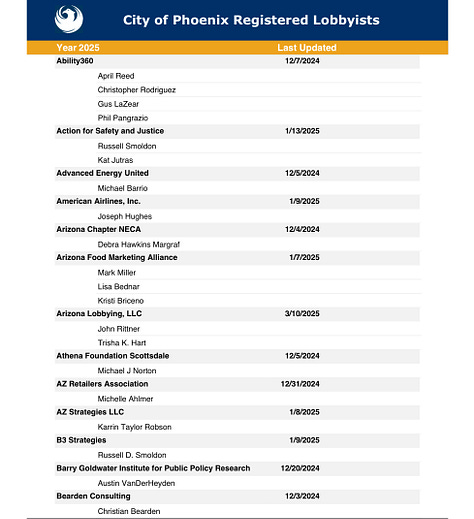
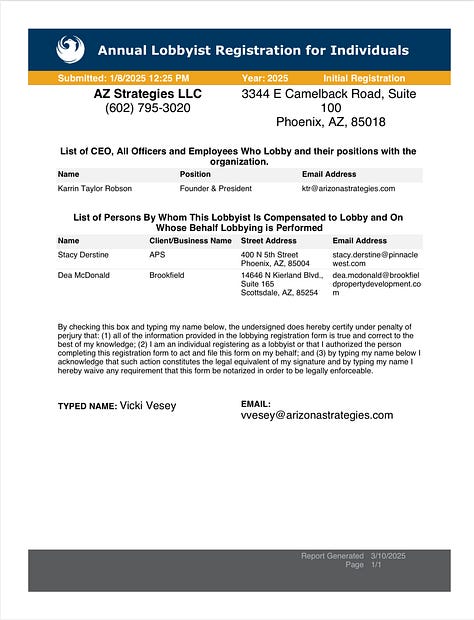
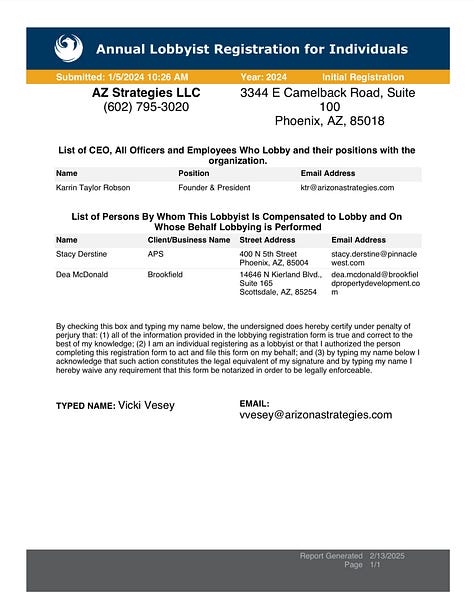
In February 2025, Robson announced her candidacy for Arizona governor, entering the Republican primary against U.S. Representative Andy Biggs. This raises an important question: Should someone who is currently or recently was a lobbyist serve as governor?
APS is the largest electric utility in Arizona and operates as a monopoly, meaning most customers in its service area have no choice but to use APS for their electricity. In a competitive market, multiple providers would keep prices in check, but APS doesn’t have to compete, giving it significant control over rates. To regulate this power, the Arizona Corporation Commission (ACC) oversees APS and other utilities. The ACC sets rates, enforces safety and service rules, and is supposed to ensure consumers are treated fairly.
However, there have long been concerns about the power that APS may wield over the ACC. The ACC is the last line of defense in regulating utility companies and protecting consumers, ensuring that rate unjustified hikes don’t push energy costs higher. If Robson, a registered APS lobbyist, were to become governor, it’s fair to ask where her priorities would lie—with the people of Arizona or the utility giant that payed her to lobby on its behalf.
PHOENIX IS A LEADER IN THE RACE TO AGENDA 2050
Under Mayor Kate Gallego’s leadership, Phoenix continues to align itself with the UN’s Agenda 2030 city initiative, prioritizing sustainability-driven policies while many argue more urgent local issues—such as crime, homelessness, and infrastructure—take a backseat. Critics highlight the heavy reliance on federal funding and taxpayer dollars to implement these costly projects, questioning whether the city’s resources are being misallocated for the sake of globalist climate goals.
One of the most recent examples is the city’s decision to purchase 47 electric school buses. While proponents claim this transition will reduce diesel emissions, skeptics argue that the high upfront costs, maintenance challenges, and limited charging infrastructure make this an inefficient use of funds.
Adding to the city’s “green agenda,” Phoenix has embraced the 15-minute city concept, an urban planning model that promotes walkability by restricting car dependency and placing heavy emphasis on public transportation, biking, and mixed-use developments. While marketed as a way to improve sustainability, critics see it as a step toward greater government control over movement, making car ownership more difficult and centralizing authority over daily life. Projects like Culdesac Tempe, a car-free neighborhood, and the expansion of light rail infrastructure demonstrate how Phoenix is adopting policies that align with a global agenda.
The World Economic Forum (WEF) Agenda 2030 sets global sustainability goals, including carbon neutrality, clean energy, and urban efficiency. Gallego herself serves as the Public Sector Chair of the 50 Liter Home Coalition, a WEF-convened group that promotes extreme water and energy efficiency measures in urban areas. In 2020, she was named a WEF Global Leader, further solidifying her connections to international sustainability efforts. See the City of Phoenix Climate Action Plan for more details.
In 2020, Phoenix joined the C40 Cities Climate Leadership Group, a global network of nearly 100 major cities committed to addressing climate change. Below is Mayor Gallego’s pledge to go Net Zero, also known as “carbon neutral,” and the steps the city is taking to accomplish that goal. Experts say that going “green” will increase energy rates and lead to blackouts in Arizona. Yet, Phoenix is ALL-IN on going carbon-free, eliminating all fossil fuel use and replacing it with wind, solar, and battery power.
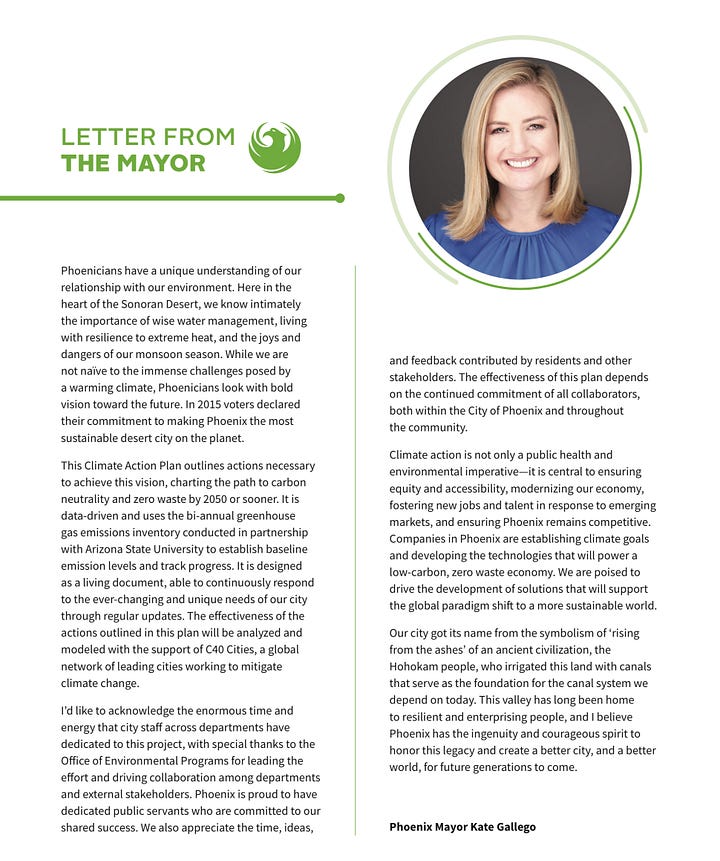
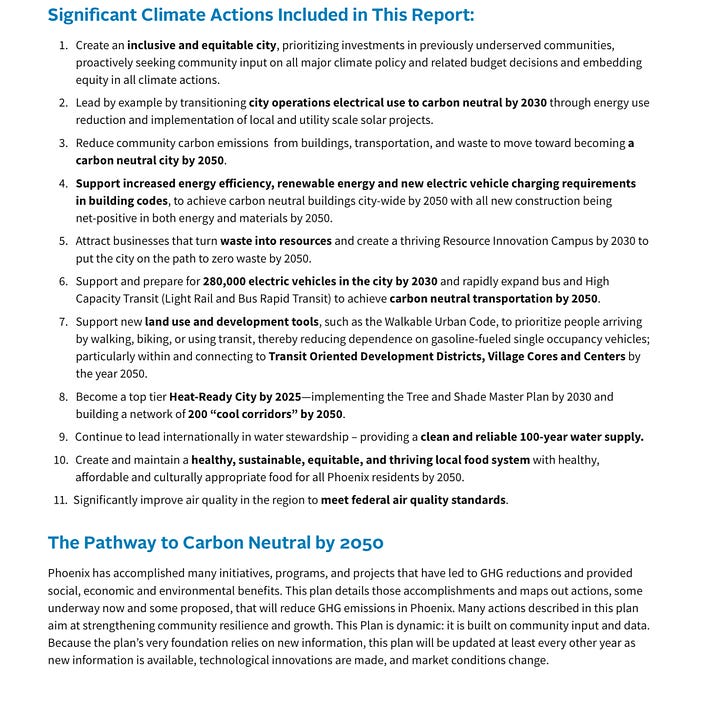
APS HAS PLEDGED NET-ZERO BY 2050
“APS is committed to providing 100% clean and carbon-free energy by 2050 while providing reliable and affordable energy to meet our customers’ needs. The goal includes a nearer-term 2030 target of achieving a resource mix that is 65% clean energy, with 45% of our generation portfolio coming from renewable energy. In addition, we plan to exit from all coal-fired generation by 2031.” APS.COM
APS COMMITTED TO SPECIFIC DIVERSITY, EQUITY & INCLUSION (DEI) METRICS
“At APS, our workforce is made up of talented people from all kinds of backgrounds with an important variety of skills, experience and points of view. The diversity of race, gender, sexual orientation, age, religion, disability and national origin makes us who we are and makes us better and stronger.” APS.COM
APS HAS A DIVERSITY SUPPLIER PROGRAM
(APS) operates a Supplier Diversity Program aimed at engaging minority, women, LGBT, and veteran-owned businesses. With the issuance of Executive Order 14173 on January 21, 2025, which emphasizes merit-based criteria and revokes previous affirmative action mandates, there is potential for such diversity-focused programs to be scrutinized under the new federal guidelines.
Federal contractors are now required to certify compliance with anti-discrimination laws and may face legal risks if their Diversity, Equity, and Inclusion (DEI) initiatives are found to violate these laws. Therefore, APS’s Supplier Diversity Program could be at risk of non-compliance under the new executive order.
Robson will face Representative Andy Biggs in the primary, but key questions remain about her ties to APS and the City of Phoenix, both of which are fully committed to ESG (Environmental, Social, and Governance) and DEI (Diversity, Equity, and Inclusion) initiatives. Given her lobbying work for APS, can she truly stand up to the state’s largest utility company when it comes to protecting consumers from rising energy costs? What exactly did her lobbying efforts for APS entail, and how might that influence her policies as governor? If Robson responds to our inquiries, we will update this story accordingly.
Until Next Time, Ditat Deus: Always Forward, Arizona.


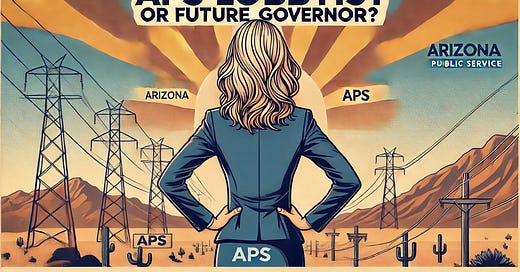



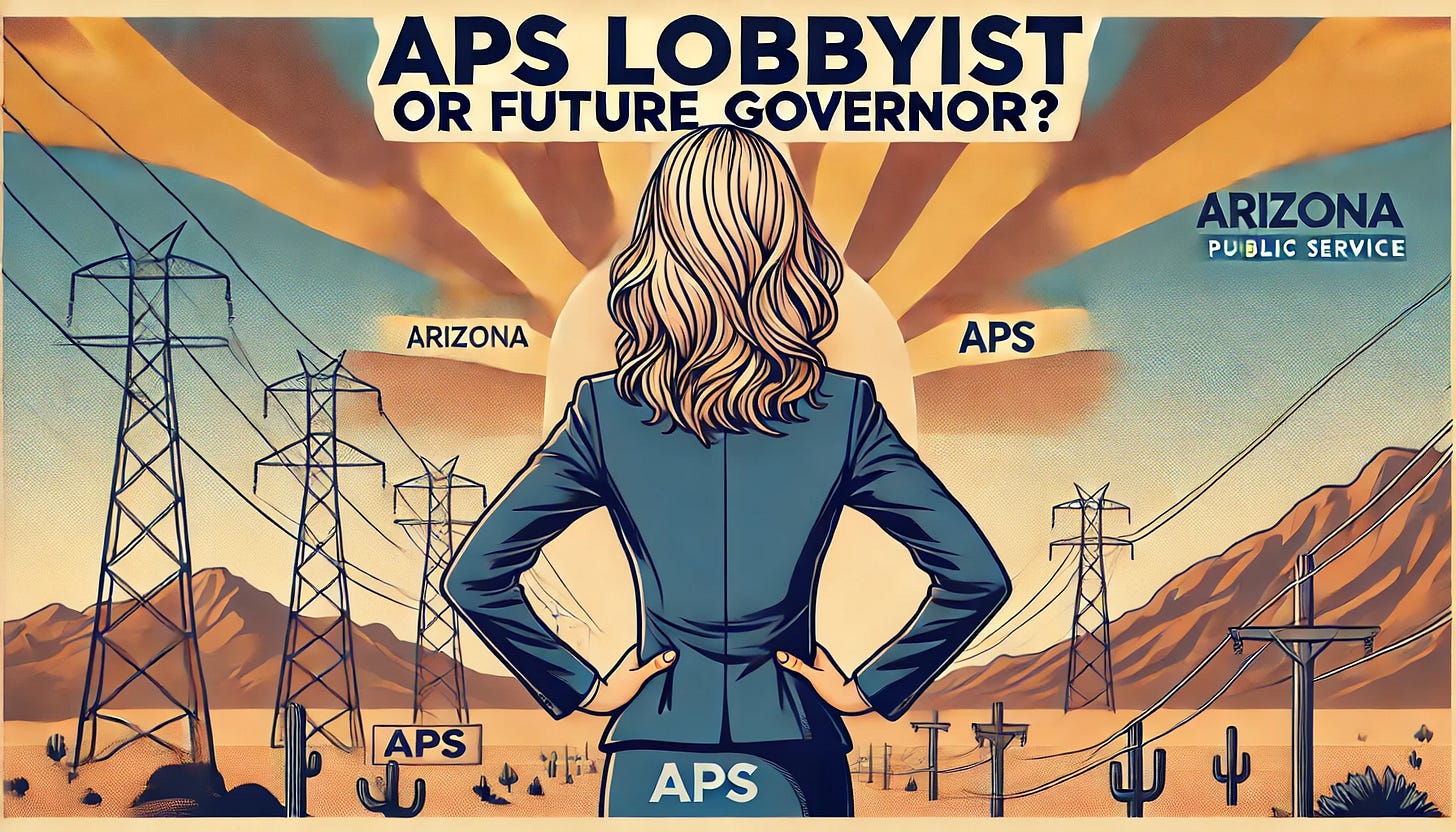
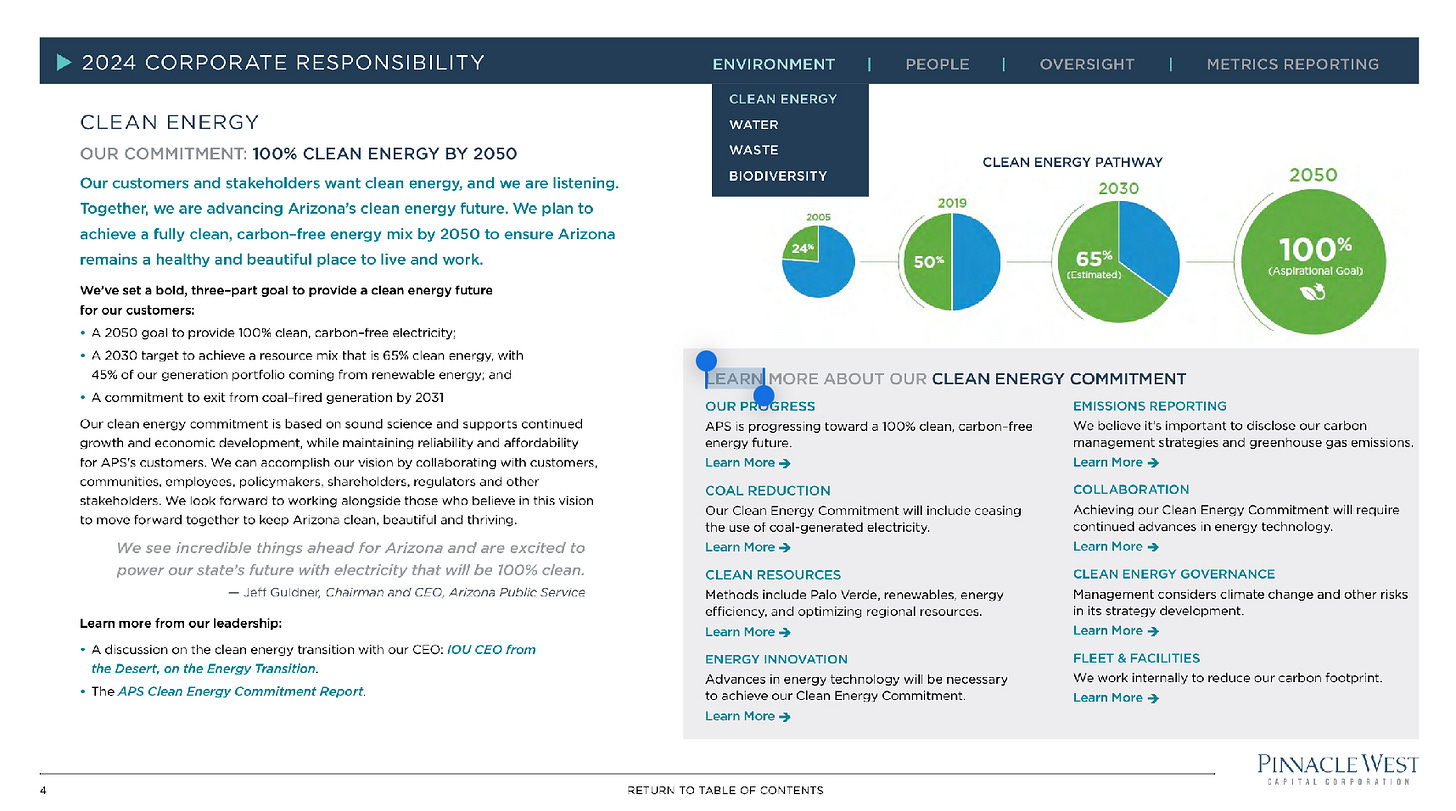
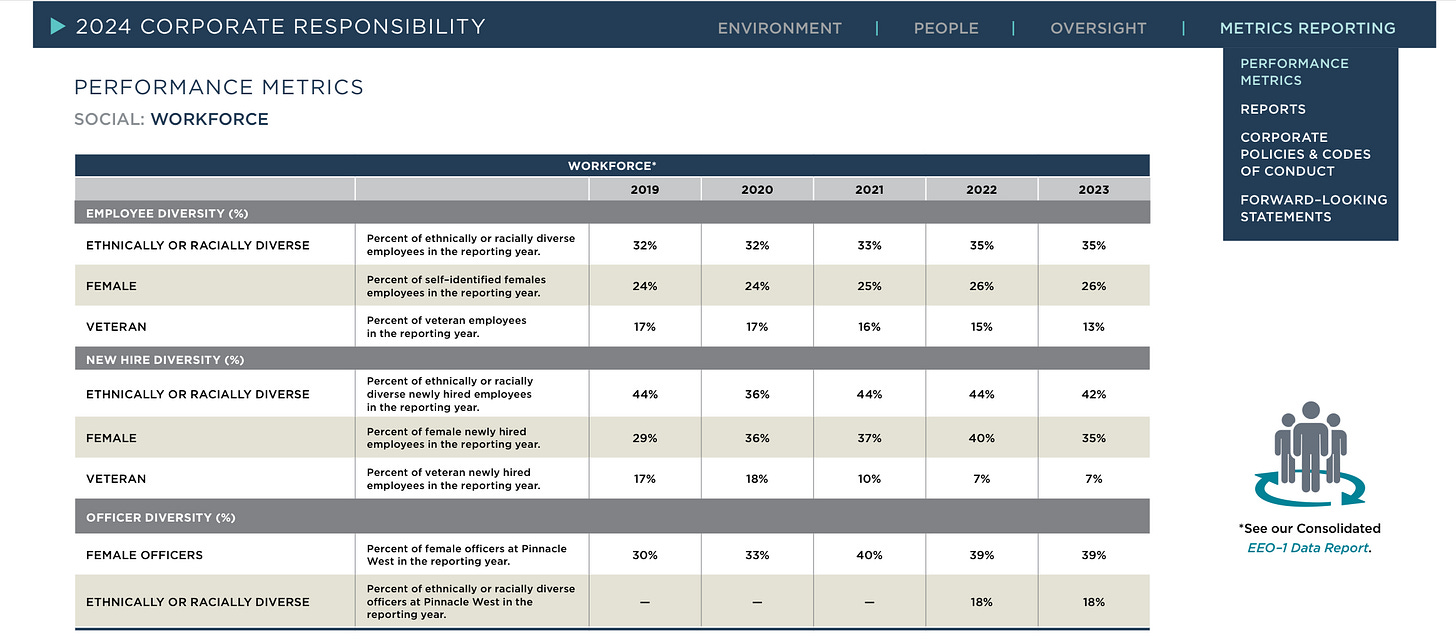
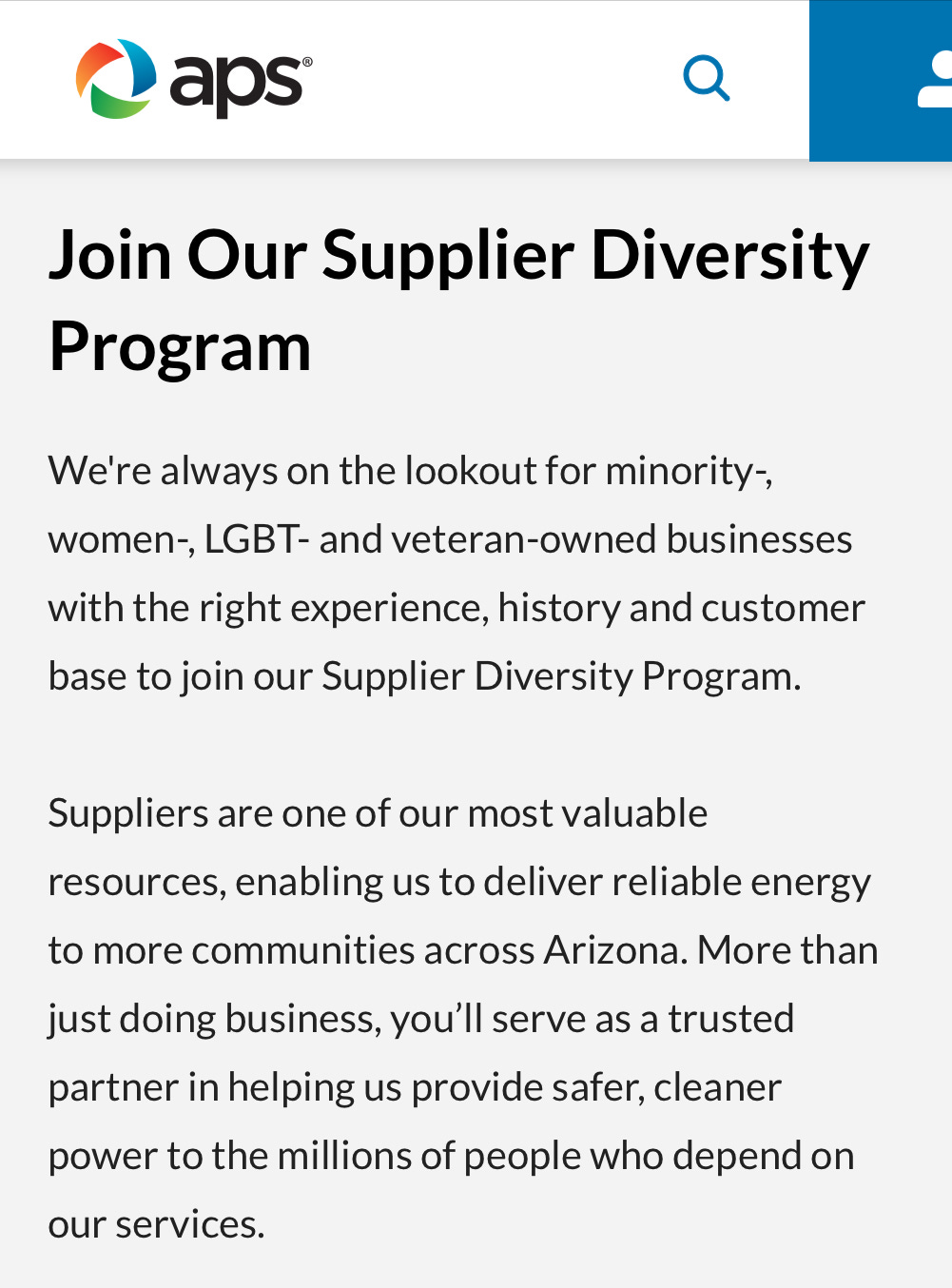
No question that Biggs is the right choice.
On several occasions Robinson has shown that she is not an America first candidate.